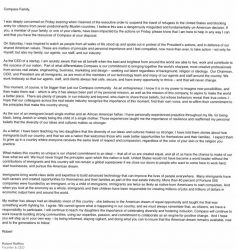President Donald Trump’s ban on citizens of seven Muslim-majority nations earned him the condemnation of several titans of industry from the technology, finance and consumer-goods sectors. Largely absent from the conversation: the real estate industry, whose leaders Trump counts among his most zealous backers.
A few prominent players in the residential space, however, are making their displeasure with Trump’s policy clear. In a letter to agents and staff, Robert Reffkin, CEO of Compass, denounced the president’s order as “dangerously misguided and fundamentally un-American.”
As the head of a startup, he wrote, “I am acutely aware that we all benefit when the best and brightest from around the world are able to live, work and contribute to the success of our nation.”
Reffkin [TRDataCustom], whose mother immigrated from Israel, told The Real Deal in an interview Monday that Compass’ other three top executives – Ori Allon, Maelle Gavet and Leonard Steinberg – are all immigrants, as are most members of the startup’s technology team.
Citing Trump’s real estate roots and the prominence of foreign-born agents as well as international investors in the industry, Reffkin urged real estate firms to take cues from tech and Wall Street heavyweights who voiced opposition to the order over the weekend.
Google co-founder Sergey Brin marched in a rally opposing the ban, which affects citizens of Syria, Iraq, Iran, Yemen, Libya, Somalia and Sudan. Airbnb CEO Chesky offered free lodging for refugees. Starbucks CEO Howard Schultz pledged to hire 10,000 refugees over the next five years. Even Lloyd Blankfein, CEO of Goldman Sachs, spoke out against the ban.
“This country will not remain a global superpower if we close our doors,” said Reffkin, whose company raised $75 million from investors this summer for a $1 billion-plus valuation.
We have been, we are, and we always will be a nation that challenges unjust laws that violate our values. Laws change, values endure. https://t.co/w9wJr00F35
— Vishaan Chakrabarti (@VishaanNYC) January 29, 2017
Trump’s executive order, signed Friday, set off widespread protests, and in New York, several top agents were among the protestors at John F. Kennedy Airport and Battery Park City, while others took to social media to oppose the ban. “I am an immigrant — I am a part of what has been called the American Dream,” Douglas Elliman’s Frances Katzen posted on Instagram.
“To be silent is a disgrace,” said Warburg Realty’s Jason Haber, who posted a picture of himself protesting in Battery Park City on Sunday.
“The story of real estate in New York is a story of immigrants,” he told TRD, calling Trump’s immigration policy “antithetical” to that narrative.
Haber also took aim at Trump’s real estate allies. “If you want to lie in bed with Trump, metaphorically, you can do that but you have to be prepared to pay the consequences,” he said.
Most of the firms reached by TRD declined to comment on Trump’s ban, including JLL, CBRE and Marcus & Millichap.
Others did not return calls seeking comment, including Elliman chair Howard Lorber, who is on Trump’s economic advisory team, and representatives from Realogy, Century 21 and Coldwell Banker.
“The real estate people are not going to rise up against Trump,” said one source. “Let’s put it this way. The real estate people are watching their dollars.”
On Monday, a number of brokerage heads contacted by TRD said they preferred to keep politics out of the office.
“Never will we ever try as an organization to impose a political view on our agents,” said Nest Seekers International CEO Eddie Shapiro, who questioned the wisdom of protesting. “Taking it to the streets every other day… is disruptive to our economy.”
But Michael Greenberg, CEO of The Level Group, said the Trump administration crossed a line. “If you look at the faces on my website, it’s people from all over the world. But it’s not just for that reason I care about this issue,” he said, “The time has come for all people of conscience to step forward,” he said.
Frederick Peters, CEO of Warburg, put it this way: “If I did in our housing market what the government is doing at the airports, I would lose my license and be subject to prosecution and fines,” he wrote in a blog post Monday.
Buyers from Muslim-majority nations have been responsible for some of New York City’s biggest real estate purchases of the past few years.
At 432 Park Avenue, for example, the buyer of the condo’s $87.7 million penthouse is reportedly Saudi retail magnate Fawaz Al Hokair, while a Qatari buyer was looking to combine several units to create a $250 million penthouse at 220 Central Park South.
Last year, the Olayan Group, a Saudi blue-chip investor with a stake in the Related Companies, bought the Sony Building at 550 Madison Avenue for $1.4 billion.
Now, some voiced concern that Trump’s policies and anti-immigrant rhetoric could curtail such investments.
“The concern is that the perception will be that we’re no longer a hospitable environment for offshore investment because our borders are becoming less welcoming,” said Stuart Siegel, president and CEO of Engel & Volkers New York. “You’ve got to start to wonder what the immediate impact will be for tourists and students, and quite frankly, their parents.”

